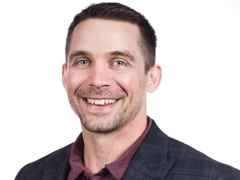Making online places healthier
People with mental illness die 15 to 30 years younger than the general population, largely due to cardiovascular disease; physical health complications are becoming the most life-threatening element of severe mental illness. This happens across all types of mental illness and in countries of all income levels. Manchester researcher Professor Joseph Firth talks about working with the World Health Organization (WHO) on a global public health approach to addressing physical health inequalities in mental illness.

Key facts
Real need
Reducing physical health inequalities in people with mental illness is a global health priority: the World Health Organization, the NHS and the National Institutes of Health (NIH) in America all see it for the major problem it is.
While there has been a global surge in the numbers of digital apps that are designed to improve physical health and fitness, there remains little focus on how digital technologies can be used to support and improve physical lifestyle interventions for people living with mental health conditions - addressing physical health as a way of improving mental health care.
My work addresses this through lifestyle interventions in the early phases of severe mental illness. The aim is to build exercise, nutrition and similar interventions into mental health care. This sounds obvious to the general population, but the unfortunate truth is that healthy lifestyle interventions are still not a standard part of clinical practice, despite the well-known benefits. Mental health medications themselves can also have physical side effects, which worsens the situation.
Working with YouTube
My research is looking at using digital technologies to improve physical health in mental health care. One of our main initiatives will be delivered through an interactive online platform as a YouTube Health channel. This will be the first ever online evidence-based lifestyle programme specifically for young people with mental illness, which is the best time to intervene with lifestyle support.

Professor Joseph Firth
Joseph is a Professor of Psychology and Mental Health and UKRI Future Leaders Fellow at The University of Manchester, and an Honorary Fellow at Western Sydney University.
We’ve partnered with YouTube Health and are working with fitness influencers, nutritionists, and researchers to build an interactive channel. Clinicians currently don’t have much to provide for physical health, other than monitoring, so soon they’ll be able to direct people to here.
We’re also developing a website to give people a more personalised journey through the content, and building an AI agent that can provide lifestyle advice, workouts and nutrition support via video. This has been co-designed with service users.
Our ultimate end goal is scalability, and online delivery is much easier to scale than in-person interventions. YouTube is a perfect platform since we have found that young people with mental health conditions are already widely using this for health information, and it’s generally globally available and has features like auto-translation.
Low-cost intervention
The field of lifestyle medicine for mental health is quite new and not widely implemented. Internationally, only a handful of groups are leading it, and we’re working to establish lifestyle approaches as a third pillar of mental health care alongside medication and psychological therapy. We’re bringing together fitness and nutrition experts, psychiatrists, academics and people with lived experience to co-produce accessible, evidence-based content.
Looking ahead, our plan is to provide personalised coaching - eventually even practical support like food shopping lists aligned with nutritional needs, finding local leisure opportunities, or arranging free gym access. Right now, it exists as a chatbot for testing, but with funding we can build it into something far more advanced.
Lifestyle medicine has the potential to transform health outcomes at a population level. Currently, physical and mental health are treated separately, often to the detriment of one another. Lifestyle psychiatry bridges the two, embedding holistic, evidence-based practices that improve both physical and mental health, reduce disparities and can be delivered in scalable, low-cost ways.
What we’re suggesting is practical for everyone, from support workers to national health commissioners, and is particularly applicable in low-resource settings, as my colleagues have shown running programmes in refugee camps in Bangladesh, or through community care settings in Uganda.
These interventions don’t rely on expensive resources, but can still deliver impact and help protect physical health in people with mental illness.
